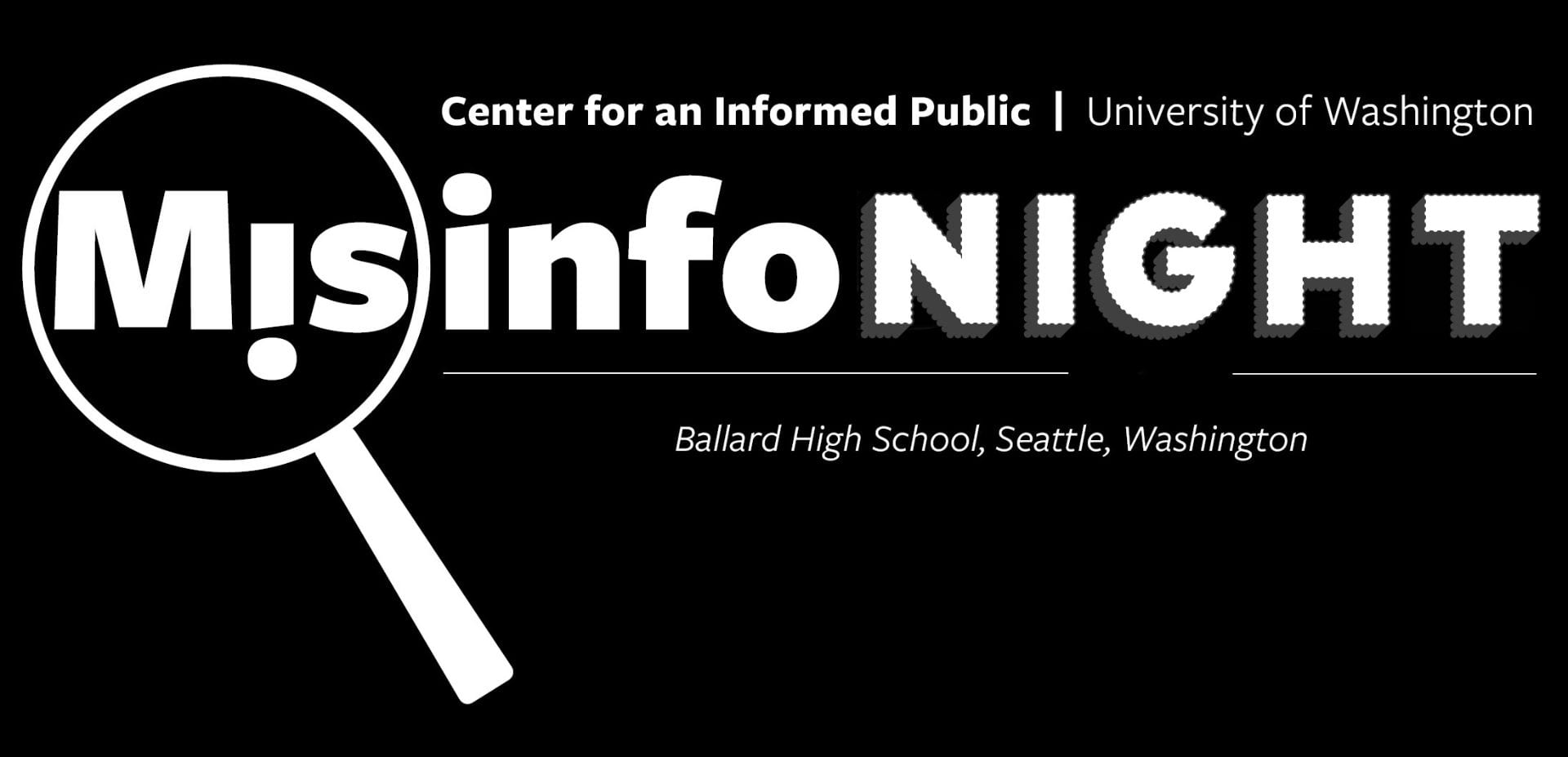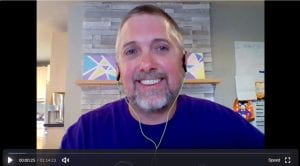By Elliot Trotter
More than 300 Seattle high school students, their parents, and educators from Ballard High School gathered virtually on Oct. 28 to watch student presentations about misinformation awareness and education. “MisinfoNight” — organized by Ballard High School teachers Shawn Lee, Robin Dowdy, and Kyle Morean — gave students the opportunity to educate peers and share their insights after learning techniques for critically analyzing digital media and other online information.
Also in attendance was UW Information School MLIS graduate Liz Crouse, a librarian at Seattle’s Nathan Hale High School who played a key role in developing the curriculum used to prepare students and is working with the Center for an Informed Public to organize MisinfoDay 2021.
The event kicked off with a keynote discussion featuring Center for an Informed Public director Jevin West, who detailed the CIP’s mission and highlighted the center’s recent work with the Election Integrity Partnership, a consortium of disinformation/misinformation researchers. West, an associate professor at the iSchool, remarked on how the skills student presenters have developed for MisinfoNight are valuable amid a climate of fading trust in institutions.
Groups then split out into breakout rooms to watch student presentations on a host of topics addressing misinformation present in contemporary politics. “Students were instructed to find a piece of misinformation ‘in the wild,'” said Lee. “Students were strongly encouraged to find misinfo around the election, COVID-19, Black Lives Matter protest, or other current events.”
More than 150 students presented on topics like mail-in voting, fact-checking on Facebook, and a local mayor who had shared QAnon conspiracy theories.
At the center of the student work was the SIFT technique pioneered by Washington State University’s Michael Caulfield — a digital literacy expert who regularly collaborates with CIP researchers. Student presenters used tweets, news articles, and YouTube videos to demonstrate how the SIFT technique helps people determine fact from fiction, encouraging them to ‘Stop, Investigate, Find better coverage, and Trace claims.’
For the presenting students, MisinfoNight was the culmination of two weeks in preparation for their presentations after a month-long media literacy unit. “First the students analyze their own media environment – what kind of information are they exposed to online and on their social media feeds,” said Lee. “Then they learned about confirmation bias and algorithms. We then spent a week on fact-checking skills that focused on Michael Caulfield’s SIFT technique.”
“Misleading information isn’t victimless,” cautioned one Ballard High School student during a presentation on voter fraud that advised listeners to directly address statements by examining the sources of claims.
View this post on Instagram
After a successful pilot MisinfoNight in May, October’s event saw multiple classes participate for the first time. It was a resounding success in the eyes of parents, students and educators. “I know our BHS students are going to be able to be much better-informed citizens and voters due to this unit,” said parent Kelley Hofmann.
Another parent, Marrianne Holec, found MisinfoNight to be especially prescient during the divisive U.S. elections. “It was fascinating to me how quickly anyone (kids and adults alike) can get entangled in a web of misinformation,” Holec said. “I also really appreciated the opportunity for my child to not only collaborate with folks at UW, but to also be the teacher and for me to be her student.”
Ballard High School history teacher Kyle Morean, one of the event’s organizers, found student presentations to be nothing short of remarkable. “I was blown away by the depth and quality of original research and analysis of team’s SIFT-ing of information and source credibility,” Morean said. “I saw students who are eager to be a part of the solution are empowered to combat the scourge of mis/dis-information. We witnessed the work of 21st-century civics education and young leaders showing creativity and radical imagination of the world as it could be.”
Facilitator Shawn Lee is anxious to continue the program’s momentum with his recently formed Teachers for an Informed Public—a K-12 educator training initiative inspired by the mission of the CIP. “This year’s goal for Teachers for an Informed Public (TiP) is to have MisinfoNight-like events happen in schools throughout the state of Washington,” Lee said.
ADDITIONAL INFORMATION:
- The Center for an Informed Public is gearing up to host a virtual MisinfoDay 2021. Learn more about MisinfoDay and stay tuned for planning updates.
- Interested in the work of Teachers for an Informed Public? Email misinfoday@uw.edu and we’ll be happy to connect you with the educators behind the effort.





